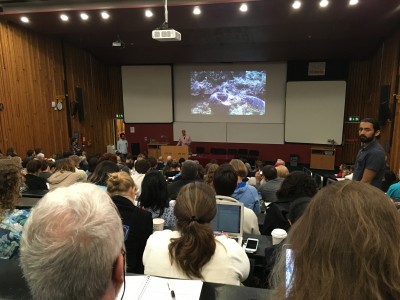NSU Newsroom
SharkBytes
Horizons
This version of NSU News has been archived as of February 28, 2019. To search through archived articles, visit nova.edu/search. To access the new version of NSU News, visit news.nova.edu.
This version of SharkBytes has been archived as of February 28, 2019. To search through archived articles, visit nova.edu/search. To access the new version of SharkBytes, visit sharkbytes.nova.edu.
Halmos Faculty Presents Keynote Lecture at World Sponge Conference
This past June, Halmos faculty member Jose Lopez, Ph.D. was invited to present the keynote lecture at the 10th World Sponge Conference (WSC) in scenic Galway, Ireland. The lecture, “Function and Form: Finding the Raison D’être of Symbiotic Communities within Sponges” focused on Lopez’s 20 years of marine sponges research. Lopez considers the WSC as one of his favorite meetings to attend. “I have many friends and colleagues there. And although we had a near record attendance of about 300 scientists and students at this year’s WSC, this is still fairly a small meeting”.
Conference topics ranged from determining the relatedness of sponge families (taxonomy), to sponge geology, new potentially therapeutic natural products, microbial symbionts and even bizarre carnivorous sponge species that live in caves.
Along with the keynote lecture, Lopez co-authored posters and talks with NSU alumni, Andia Chaves Fonnegra, Ph.D.’14 and Alexandra Campbell, M.S.’14 as well as his postdoctoral scientist, Cole Easson, Ph.D. The conference showed that there is a growth and interest in sponge biology, made even more poignant as we see a continuing decline in “coral” reefs around the world. Sponge reefs exist and may be thriving in this constantly changing world.
